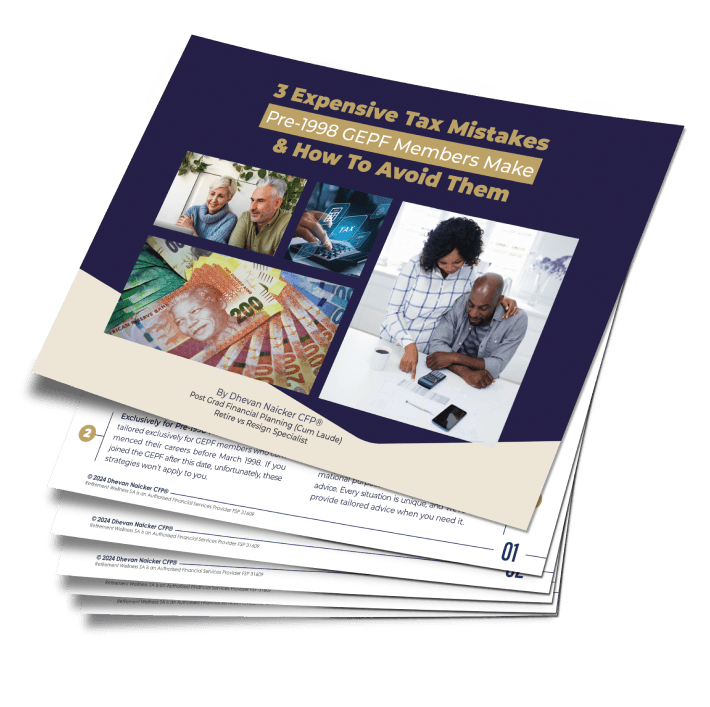If you’ve worked in the public sector for decades, retiring or resigning might feel like the final stretch of the race. But the truth is — what happens after you leave government is what determines whether you enjoy the life you’ve earned… or run out of money too soon.
At Retirement Wellness SA, we’ve seen both outcomes up close. Some clients are thriving — building wealth, helping their families, and living stress-free. Others are struggling — dipping into capital too quickly or getting blindsided by tax and inflation.
So what makes the difference?
Let’s unpack it.
It’s Not About Retire vs Resign. It’s About You
The biggest misconception we see is the idea that choosing retirement over resignation (or vice versa) automatically leads to a better outcome.
That’s not true.
Success doesn’t come from the route you choose — it comes from the financial discipline you bring to the journey.
Whether you retire or resign, you’ll likely receive a lump sum and need to draw monthly income from your capital.
The real question is:
Can you manage both — without draining your funds?

Discipline: The Game Changer
Every successful client we’ve helped has one thing in common:
Discipline.
This includes:
- Paying off all high-interest debts first
- Avoiding lifestyle inflation after payout
- Setting aside money for emergencies
- Following a strategic, tax-efficient income plan
- Being cautious with access to capital — even when it’s available
You’d be surprised how many government employees resign, gain access to their full capital… and start withdrawing far more than they need. The result?
Their capital drops — and their future becomes unstable.
The Role of Debt (And Why You Must Eliminate It)
If you’re heading toward retirement or resignation with unpaid debt — stop and plan.
Debt repayment must be a priority, because every rand going toward interest is a rand that isn’t building your future.
Once debt is cleared, our clients often tell us they sleep better, feel freer, and gain financial breathing space.
Better yet, settling debt early gives you more flexibility with your monthly income, allowing you to draw less and preserve capital longer.
Income Strategy: Set It Up Right From Day One
After leaving government, your income stream needs to do two things:
- Cover your monthly expenses comfortably
- Last for the rest of your life
When you retire, income is mostly fixed based on the formula.
When you resign, you get more flexibility — but also more responsibility.
If you lack discipline, resignation can be dangerous — you may take too much, too soon.
But with the right guidance, resignation becomes a tax-efficient, legacy-building strategy.
You’re in the Driver’s Seat — But You Need a Navigator
We often say:
“You’re driving the retirement vehicle — we’re here to guide the journey.”
If you’re already good at managing money and you’ve developed healthy habits, either route — retire or resign — can lead to long-term success.
But if you’ve struggled with budgeting or debt in the past, it’s vital to have a clear, realistic, and professional plan in place.
Key Questions to Ask Yourself Today
- Do I know how much income I need monthly — after tax?
- Do I have debt I need to clear before I leave?
- Am I in control of my spending, or do I overspend when large sums are available?
- Have I created a plan to protect my capital for the long term?
Final Thoughts
There’s no magic formula.
Success isn’t about choosing retirement or resignation.
It’s about:
- Understanding the risks
- Protecting your future
- Working with the right team to guide you
If you’re ready to plan properly — or already facing a few financial fears — you’re not alone.
And we’d love to support you on the path forward.
Wath the full video here: https://youtu.be/exIWgi1dJIk
📩 Let’s Help You Make It
📧 Need support?
Contact us: retirewell@retiresa.co.za
📺 Watch the FREE Retire vs Resign Masterclass now
👉 https://www.retirevsresign.co.za/online/
🔒 Book your VIP consultation today
👉 https://www.retirevsresign.co.za/consult/
Disclaimers:
- Retirement Wellness SA is an Authorised Financial Services Provider (FSP 31609).
- This blog post provides general information and does not constitute financial advice.
This information is not provided by or on behalf of the Government Employees Pension Fund (GEPF). We do not act on behalf of the GEPF.

